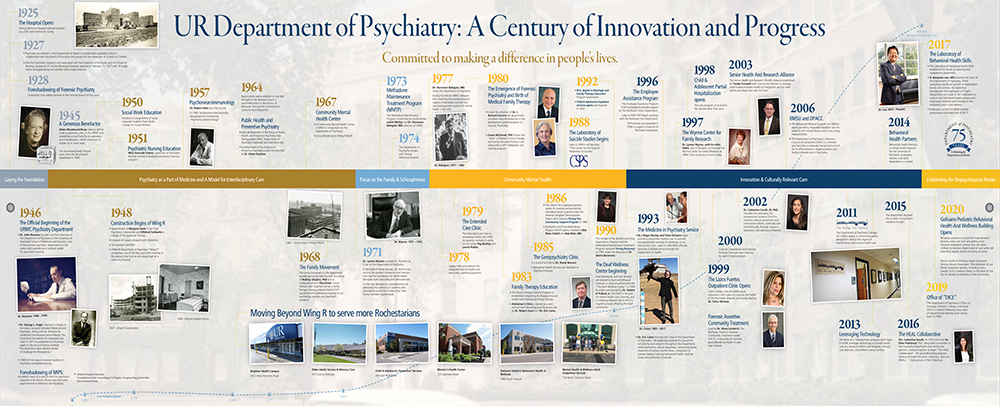History

A long-standing tradition of excellence in psychiatry.
Since its inception in 1945, our Department of Psychiatry – one of the first of its kind – has remained at the forefront of psychiatric medicine and care.
As part of UR Medicine, a world-class medical center and leading academic institution, our Department has also remained true to our mission of delivering outstanding patient-centered care, conducting breakthrough research and training the next generation of psychiatric clinicians, researchers and teachers. In fact, we were the birthplace of the biopsychological model of health and illness that serves as the cornerstone of education and training of students and trainees across the field of psychiatry.
As we lead the way to the future of psychiatry, we reflect on our long and distinguished history. We attribute many of our successes and accomplishments to our Department’s founders and early trailblazers.
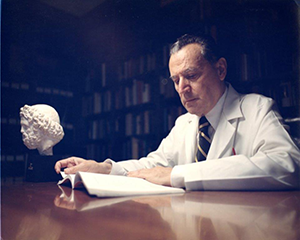 John Romano, M.D.
John Romano, M.D.
Dr. John Romano was the founder and first chairman of the Department of Psychiatry at the University of Rochester School of Medicine and Dentistry from 1946 to 1971. His influence as a charismatic educator and physician permeated the school and Strong Memorial Hospital for nearly 50 years, from 1946 until his passing in June 1994. Dr. Romano is regarded as a founding father of modern American psychiatry and is recognized worldwide as a reformer of medical education.
A caring nature and keen interest in people were evident throughout Dr. Romano’s career. His unwavering commitment to improve the lives of patients, students, peers, family and friends was remarkable, even in the last days of his life. Dr. Romano championed the idea that dialogue between patient and physician is an integral part of the healing process, which remains a pillar in today’s biopsychosocial model of teaching and patient care at the School of Medicine and Dentistry and at Strong Memorial Hospital, and is a hallmark of a Rochester-trained physician.
George L. Engel, M.D.
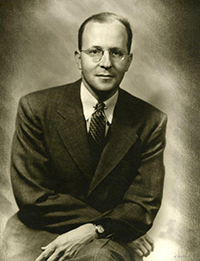 When Dr. John Romano was offered the opportunity to establish an entirely new psychiatry department at the University of Rochester School of Medicine and Dentistry in 1946, he invited Dr. George L. Engel to join him in Rochester, with dual appointments in psychiatry and medicine. Dr. Engel established a medical psychiatric liaison service staffed largely by internists, became deeply involved in the incorporation of psychiatric training in the medical school curriculum and began his own training in psychoanalysis. This training initially took place with Sandor Feldman in Rochester, and then at the Chicago Institute for Psychoanalysis and the New York Psychoanalytic Institute.
When Dr. John Romano was offered the opportunity to establish an entirely new psychiatry department at the University of Rochester School of Medicine and Dentistry in 1946, he invited Dr. George L. Engel to join him in Rochester, with dual appointments in psychiatry and medicine. Dr. Engel established a medical psychiatric liaison service staffed largely by internists, became deeply involved in the incorporation of psychiatric training in the medical school curriculum and began his own training in psychoanalysis. This training initially took place with Sandor Feldman in Rochester, and then at the Chicago Institute for Psychoanalysis and the New York Psychoanalytic Institute.
In 1953, Dr. Engel began collaboration with Franz Reichsman on the Monica project, a study which extended from Monica's infancy to adulthood. By the mid-1950s, he was one of the leading figures in psychosomatic studies and was prominent in the American Psychosomatic Society, editing its journal (Psychosomatic Medicine). Dr. Engel also began publishing numerous books and articles on the relation of emotion and disease and on the incorporation of these ideas into medical training and clinical practice. Under his direction, the program in Rochester became a leading center in the development of psychosomatic theory and training. The ultimate expression of Dr. Engel's ideas came to be termed the "biopsychosocial model." In 1979, he stepped down from directorship of the Medical Psychiatric Liaison Group that had flourished under his direction for more than a quarter century. Dr. Engel passed away in 1999.
 William A. Greene, M.D.
William A. Greene, M.D.
Dr. William A. Greene was an assistant resident at Strong Memorial Hospital, prior to serving as Commonwealth Fund Fellow in Medicine and Psychiatry at the University of Rochester Medical Center between 1948 and 1950.
In 1950, he joined the senior staff of the Medical Psychiatric Liaison Group and was made instructor in Medicine and Psychiatry the same year. Dr. Greene later served as assistant professor in 1959 and a full professor in 1967. His research focused on the correlation between psychological factors and disease. Dr. Green died in December 2000.
Otto F. Thaler, M.D.
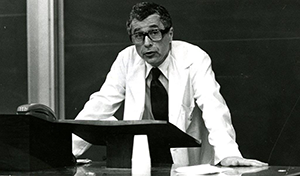 Dr. Otto F. Thaler was a member of the Department of Psychiatry at the University of Rochester School of Medicine and Dentistry from 1955 until his death in 1996. He may best be remembered as an educator and a clinician. Dr. Thaler directed programs within the Department of Psychiatry for the education of first- and second-year medical students, as well as the training and supervision of psychiatry residents. At different stages of his career, he also directed inpatient and outpatient services within the Department.
Dr. Otto F. Thaler was a member of the Department of Psychiatry at the University of Rochester School of Medicine and Dentistry from 1955 until his death in 1996. He may best be remembered as an educator and a clinician. Dr. Thaler directed programs within the Department of Psychiatry for the education of first- and second-year medical students, as well as the training and supervision of psychiatry residents. At different stages of his career, he also directed inpatient and outpatient services within the Department.
In 1949-1950, Dr. Thaler did a rotating internship at Strong Memorial Hospital, and during this stage of his training, decided on a career in psychiatry. However, he was called into military service for the second time and did not complete his residency in psychiatry until 1955. He was almost immediately appointed instructor in psychiatry and began training in psychoanalysis under Sandor Feldman, M.D. (1890-1973), a disciple of Freud and an internationally renowned psychoanalysist who in 1941 had joined the psychiatry unit at Rochester (then part of the Department of Medicine). In September 1959, Dr. Thaler began training at the Downstate Psychoanalytic Institute. He made frequent visits to New York City over a period of four years in order to complete the program in June 1963.
Robert Ader, Ph.D.
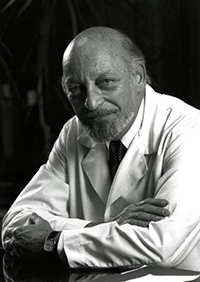 Dr. Robert Ader joined the Department of Psychiatry at the University of Rochester School of Medicine and Dentistry in 1957 and remained a faculty member for 55 years. His name will forever be associated with “psychoneuroimmunology,” a term he coined in his 1980 presidential address to the American Psychosomatic Society, and which was used a year later as the title for a collection of essays signaling the emergence of the new field.
Dr. Robert Ader joined the Department of Psychiatry at the University of Rochester School of Medicine and Dentistry in 1957 and remained a faculty member for 55 years. His name will forever be associated with “psychoneuroimmunology,” a term he coined in his 1980 presidential address to the American Psychosomatic Society, and which was used a year later as the title for a collection of essays signaling the emergence of the new field.
Dr. Ader was internationally recognized for work establishing the influence of the brain on the immune system. As early as the 1950s, his research had touched on the relation of emotion to susceptibility to disease – particularly to gastric lesions in rats. From the mid-1970s until his death in 2011, psychoneuroimmunology remained the principal focus of Dr. Ader’s research and publishing activity. A pioneer in a field of study that was initially greeted with skepticism, his collaboration with such figures as Nicholas Cohen and Jan Moynihan, their meticulous research and cogent arguments were central to establishing the nervous system's influence on the immune system.
Lyman Wynne, M.D., Ph.D.
 Arriving in Rochester from the National Institute of Mental Health (NIMH) as a recognized leader in family therapy and schizophrenia, Dr. Lyman Wynne was appointed Chair of the Department of Psychiatry at the University of Rochester Medical Center (URMC) during the department’s 25th year. Dr. Wynne led the department from 1971 until 1977 when he stepped down as Chair to focus on family therapy and research.
Arriving in Rochester from the National Institute of Mental Health (NIMH) as a recognized leader in family therapy and schizophrenia, Dr. Lyman Wynne was appointed Chair of the Department of Psychiatry at the University of Rochester Medical Center (URMC) during the department’s 25th year. Dr. Wynne led the department from 1971 until 1977 when he stepped down as Chair to focus on family therapy and research.
Dr. Wynne had a long history of contributing nationally, which included his work with the NIMH in the 1950’s and 60’s as well as a leadership role as President of the American Family Therapy Association from 1986-87. In the field of family therapy, Wynne was among the greatest innovators and mentors who laid the foundation for family-based therapies both nationally and internationally.
In 1997, Dr. Wynne co-founded (with his wife, Adele, also a therapist) the Wynne Center for Family Research at URMC that continues to thrive today. In his final annual report, Dr. John Romano applauded the appointment of Dr. Wynne, his successor, stating, "His record as a scientist and as a clinician assures the further growth and development of the department . . ." a prediction that has borne true.
